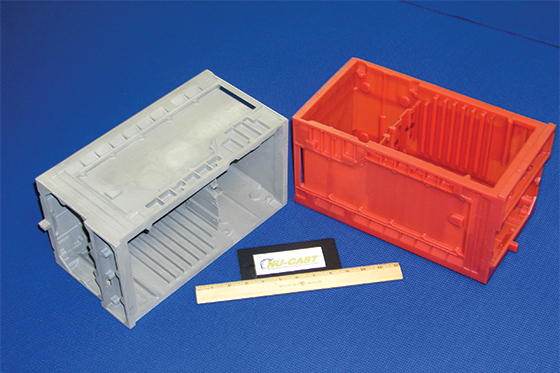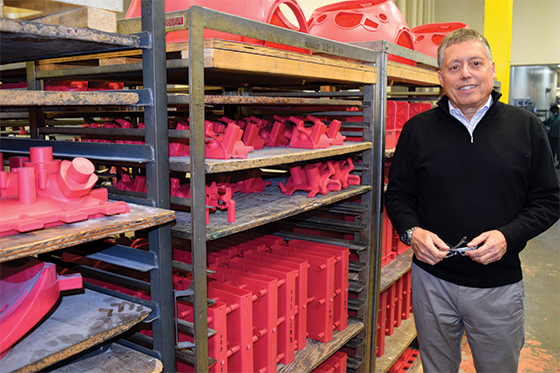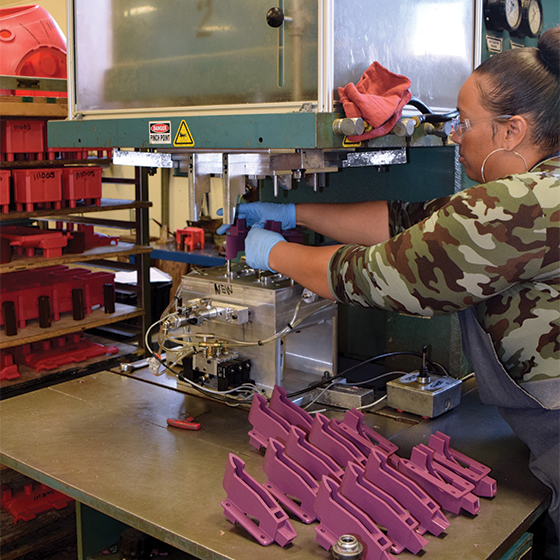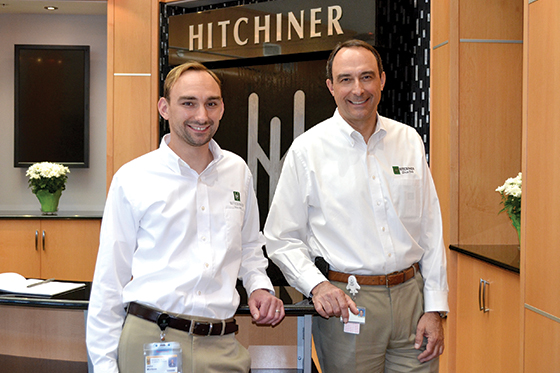
Workers on a production floor at Uni-Cast in Londonderry. Photo by Matthew J. Mowry.
Investment casting dates back thousands of years and spans the globe, from Egypt and China to Mexico—as an ancient way to create molds to manufacture jewelry and ornaments. Today, investment casting is used to make a variety of parts for industrial use, including automotive parts, gun casings, and components for aerospace and military applications. It has also grown into a cottage industry in NH as the Granite State is home to several investment casting manufacturing companies.
So what is investment casting? “Investment casting is a manufacturing process in which a wax pattern is coated with a refractory ceramic material. Once the ceramic material is hardened, its internal geometry takes the shape of the casting. The wax is melted out, and molten metal is poured into the cavity where the wax pattern was. The metal solidifies within the ceramic mold and then the metal casting is broken out,” according to the Library of Manufacturing.
There are at least seven investment-casting manufacturers in NH (see list below). And they are a segment of a larger casting industry, including those that use a graphite mold process, sand casting, die casting and injection molding.
For example there is Diamond Casting and Machine Company in Hollis that uses die casting and produces pressure tight and explosion proof aluminum and zinc castings; Patriot Foundry and Castings in Franklin that specializes in high-quality nonferrous sand castings; Hebert Foundry & Machine in Laconia that offers aluminum sand casting, brass/bronze sand casting, green sand casting and non-ferrous sand castings; and Graphicast in Jaffrey, which offers zinc/aluminum alloy custom parts that are cast in graphite permanent molds using proprietary casting technology.
 An Investment Casting Hub
An Investment Casting Hub
“The interesting thing is that investment casting tends to be served through regional poles. There are a lot of investment casting companies in New Hampshire, Wisconsin, Michigan and Illinois,” says John Morison III, the chairman and CEO of Hitchiner Manufacturing Co. Inc.
Hitchiner is the largest investment casting company based in NH with more than 1,600 employees, of whom more than 600 are in NH. “What tends to happen is that a lot of people who work with companies end up deciding that they want to go off and form their own companies,” says Morison of the reason NH has become a hub for investment casting.
On the other end of the scale is one of the state’s smallest investment casting companies, Nu-Cast, a Londonderry-based manufacturer founded in 1985 with 37 employees. “We’re probably the smallest of all of them, size and technology wise. If you compared us to a brewery, we’re a craft beer compared to Anheuser Busch,” says Jason Lees, Nu-Cast’s general manager.
Finding Competitive Advantages
Lees says that the most difficult thing about being among so many other investment casting companies is finding new ways to be cost effective. Doug Veysey, Nu-Cast’s sales manager, says that having a niche as a precision aluminum investment casting for the defense industry (90 percent of what it manufactures is for that industry), helps Nu-Cast remain sustainable. “We’ve got our niche clientele that trusts our judgment and realizes that we can do things that other folks can’t or don’t do,” says Veysey. “We build electronic chassis that house the electronics for drive and optical systems, optical benches, night vision camera bodies, missile housings, brake components, surveillance components for drones, and things that the foot soldiers use and carry on them every day.”


Jason Lees, general manager, left, and Doug Veysey, sales manager at Nu-Cast in Londonderry.

An electronic chassis from Nu-Cast in Londonderry. The wax pattern that was injected into the tooling is on the right, and the finished aluminum component is on the left.
In addition to producing castings for the defense industry, Nu-Cast also creates parts for aerospace. “We make parts for the aerospace industry and for the defense industry primarily. That process involves making an injection mold made of aluminum. Once that mold is made, we inject wax into the mold, disassemble the mold, and that wax pattern that comes out of the mold is an exact replica of what the metal part will look like. We take that wax replica, and we put it on a tree or on an assembly, so we can carry multiple of them at one time,” explains Lees. “We dip them in ceramic slurry multiple times. And then we melt the wax out and pour liquid metal into where the wax came from. Once the metal solidifies, it becomes an aluminum casting,” he says.
Uni-Cast, which started in 1969 in Nashua and relocated to its current 45,000-square-foot facility in Londonderry in 1980, also makes defense and aerospace industry components. “We do aluminum casting for the defense and aerospace industries,” says Henri Fine, Uni-Cast’s president. “It’s a small market. There’s not many of us doing it. We are one of the leaders,” he says. Uni-Cast manufactures various castings for parts on the rotating ball that contains a sensor and camera for the Predator Drone. It manufactures pieces for Ferrari too, and among Uni-Cast’s largest customers are Raytheon and Elon Musk’s SpaceX.

Uni-Cast president Henri Fine. Photo by Matthew J. Mowry.
Uni-Cast, which in 2017 won the Best Defense Casting award in the annual Investment Casting Institute Casting Contest for a seventh time, receives CAD drawings from customers and after working with the customer on revisions, builds a wax injection tool and injects wax or produces a laser generated piece to evaluate the design.
It then creates a shell with layers of slurry and sand, and bakes the ceramic to create a mold and then heats it in a kiln. The components then go through a grinding and welding process and are X-rayed for quality assurance. “There’s a lot of processing. It’s an expensive and labor-intensive process,” Fine says. Uni-Cast was generating $4 million in revenue when Fine bought it in 2000 and has since grown annual revenue to more than $20 million. It also acquired a plant in Pennsylvania in 2007. “We are growing because of [investments in] new technology, and the military sector is making a comeback too,” Fine says.

An employee checks parts at Uni-Cast. Photo by Matthew J. Mowry.
Hitchiner, which was started in 1946, is located in Milford and has two other locations in Mexico and France. Morison, the CEO, says that Hitchiner focuses on commercial markets. “We’ve been here focusing on growing in commercial markets such as textiles, firearms, pumps, valves, hand tools, and over time have evolved into a focus on aerospace castings in super alloys and automotive applications,” he says.
Challenges
Morison says that one of the biggest issues with running an investment casting company in NH is the cost of energy in the Granite State. “It’s hard to compete here because of our energy costs, but we deal with it,” Morison says. On a brighter note, Hitchiner prides itself on sustainability. “We can always do better, but our process lends itself to recycling and reusing some of the materials that we use. Depending on the quality requirements of the product, for some products, we can recycle the wax that we use to make the patterns, we can recycle the ceramics that we use to make the molds, or recycle scrap that we either purchase or generate ourselves for metal,” Morison says. “We try to maximize when quality will allow us to recycle when we can.”

John H. Morison IV, assistant treasurer, left, and John H. Morison III, chairman and CEO of Hitchiner Manufacturing. Photo by Christine Carignan.
A huge issue in the investment casting industry is finding skilled workers, according to both Fine and Lees. Fine says Uni-Cast can’t find enough people to fill its open positions. “We have so much work,” Fine says.
Uni-Cast, which has 110 employees in Pennsylvania and 125 employees in NH, has 135 open positions. The company needs wax injectors, assemblers and grinders, among others. Uni-Cast currently relies on referrals from employees.
Lees says that America needs to get back to cultivating its population of blue-collar workers. He and Veysey want to hire new workers who are fresh out of high school and willing to work. They’re open to having an apprenticeship program. Industry experts agree the investment casting manufacturing industry in NH could grow more if companies could find the workers they need.

 Current Issue - May 2024
Current Issue - May 2024